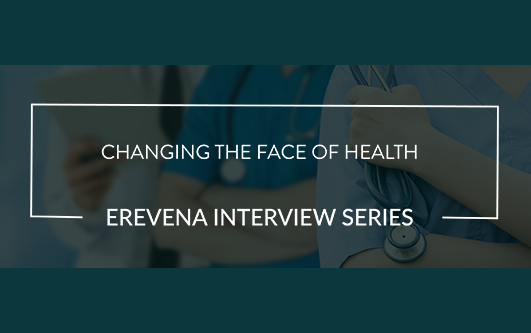Professor Sir Peter Donnelly, Founder and CEO of Genomics, talks to Hazel Mulhare, Partner at Erevena, about the huge potential for using data and genetics to transform both drug discovery and healthcare in the UK and around the world.
Peter has spent most of his career in academia, initially in mathematics and more recently in the world of genetics. He was latterly Director of the Wellcome Centre for Human Genetics at the University of Oxford, and is an Emeritus Professor of Statistical Science and a Fellow of St Anne’s College, Oxford. As an academic, his work focussed on understanding patterns of variation in human populations and the genetic basis of common human diseases. Peter founded Genomics plc in 2014 and joined the company as CEO in 2017.
Tell us a bit about Genomics plc and how it came about?
Over the last decade or so there has been a real revolution in the field of genetics. Many of us involved in those advances hoped these would have had an impact on healthcare, but it was not happening. We were not seeing the marked change in patient lives that we’d hoped for. So, in 2014 I teamed up with three other leading geneticists to form Genomics. Our idea was to bridge the gap between the scientific research and practical applications in healthcare. Our plan was to bring together the best and brightest minds in this area. We now have around 85 people located in Cambridge and Oxford here in the UK, and in Boston, USA.
Genomics is the study of a person’s entire gene set or DNA (the genome), including the interactions of those genes with each other and with that person’s environment.
Why is understanding genomics important for the future of health?
It is important in two different ways: drug discovery and healthcare. Firstly, genetics gives us a whole new route into understanding disease and biology. We have collected a lot of data, which we analyse with algorithms to find new drug targets for use in treating disease. When you consider that 90% of clinical trials fail, the ability to find better drug targets presents an exciting opportunity for more successful, faster drug discovery outcomes.
Secondly, genetics is a key part of the differences between individuals in their risk of disease, along with environmental and lifestyle factors. The powerful algorithms that we have developed summarise the genetic contribution to risk of disease for individuals, giving us an opportunity to predict risk by combining genetics with other risk factors. Today’s healthcare systems are creaking as costs continue to escalate. Nowadays, healthcare is mostly ‘sick’ care, whereby we wait until people are sick before taking action. It has become clear that to make healthcare sustainable, there needs to be more of a focus on preventing disease. What we’re doing to identify and target those at risk, using so-called genomic prevention, is a key part of this preventative healthcare strategy.
What sort of timescales are we talking about?
In terms of the applications in healthcare, we (and others) have already carried out the large studies to show proof of principle. The next step is to take this forward with implementation studies. These will look at how healthcare systems can take preventative action for those at higher risk, disease by disease. These studies need to look across the population and be able to identify these individuals and get prevention to them as quickly as possible. In the next 10 years, I hope this will become a routine part of modern healthcare systems. It’s how we will make healthcare sustainable in the long term.
How do you work with the NHS?
We work at a number of levels. Firstly, we’re in discussions at senior levels with both the NHS and government about how best to implement these studies at scale. Then, at a more granular level, we’re working with GP practices and other parts of the NHS to implement pilot studies and more local applications.
What are the main differences of working in both bio and in-silico?
In our case, the work we do in bio (healthcare) and in-silico (drug discovery leveraging computational analytics) is linked by a single idea; that of using large-scale genetic information. But drug discovery is very different to healthcare. It’s about finding significantly better targets and feeding them into the wider established research and development (R&D) process. What we’re doing in healthcare represents a paradigm shift that sees us using new tools powered by genomics to accelerate a transition to sustainable models of health.
“What we’re doing in healthcare represents a paradigm shift”
What is driving the growth of your business?
The opportunities are fantastic. This is especially so as we look at the opportunities to scale what we’re doing, although this understandably comes with its own challenges. In healthcare, we want to grow by going from the science to the products. It’s about how we move from cutting-edge science to the commercial delivery of tools able to take data and assess the risk levels of citizens and patients.
“The opportunities to scale what we’re doing are fantastic.”
How do you go about attracting the talent you need to drive this growth?
We are fortunate in not having an issue attracting talent. It is no coincidence that we are located in Oxford, Cambridge and Boston where there are large pools of really strong people. They come to us with expertise in science, software and the commercial aspects of deployment. Of course, we do compete with organisations in other sectors, such as academia and research, software, and commercial products. But we have a mission that people can be excited about; to transform healthcare and drug discovery. That’s key to our success in bringing new talent on board.
“We have a mission that people can be excited about; to transform healthcare and drug discovery.”
What impact has COVID-19 had on your sector/company?
In a way, it has been harder for those scientific organisations running laboratories than it has been for us. A lot of what we do is analytical and based on algorithms, so we haven’t had to deal with how to run a lab during the pandemic. Nonetheless, working from home and juggling other responsibilities has been challenging for some of our people and we’ve tried to help them as much as possible.
At another level, our work in healthcare has understandably felt the impact of COVID. It is no surprise that most healthcare systems are preoccupied with managing the pandemic, so some of our work on pilots and early implementation is slower than we’d hoped for. In the longer term, however, I believe there will be several positive impacts. For example, COVID has changed the way individuals feel about interacting with health systems. It has changed the way those systems think about delivering care as they look at new approaches to preventative healthcare. For example, in the UK we are seeing an acceleration in the way some data sets are being made available to researchers, and a growing emphasis on the potential of digital health. And finally, it has changed people’s (and perhaps government’s) perception of healthcare and its importance to society.
Looking ahead, as we continue to focus on long-term health issues, we will all ask what we can do differently if this happens again. It will be a changed world due to the speed at how we can respond using data and analytics. This is a positive driver for our work at Genomics.
What are the other key challenges are you facing?
The whole genomic prevention approach we are pursuing is entirely new. There is no business model. No playbook. We are trying to solve the scientific and the commercial challenges at the same time. While this is a challenge, it is also exciting.
“We’re not only a player in a new industry; we’re shaping it.”
What do you see as the future of health tech and your company in particular?
I genuinely believe that the approach we have, powered by genomics, can transform prevention in healthcare. And it will have a dramatic impact on targeted drug discovery. In both areas, the potential is huge. We feel well placed to be at the centre of this and to be part of the transformation of healthcare using powerful risk prevention tools. This represents a paradigm shift in the delivery of healthcare.
“I genuinely believe that the approach we have, powered by genomics, can transform prevention in healthcare.”
Share this article:












